Key takeaways:
- Understanding licensing is crucial for artists to secure rights and receive fair compensation for their work.
- Common pitfalls include neglecting ownership checks, failing to manage license renewals, and overlooking the fine print in agreements.
- Flexibility, communication, and thorough preparation are essential strategies for successful licensing negotiations.
- Setbacks in licensing can serve as valuable learning experiences that foster resilience and growth in navigating the music industry.
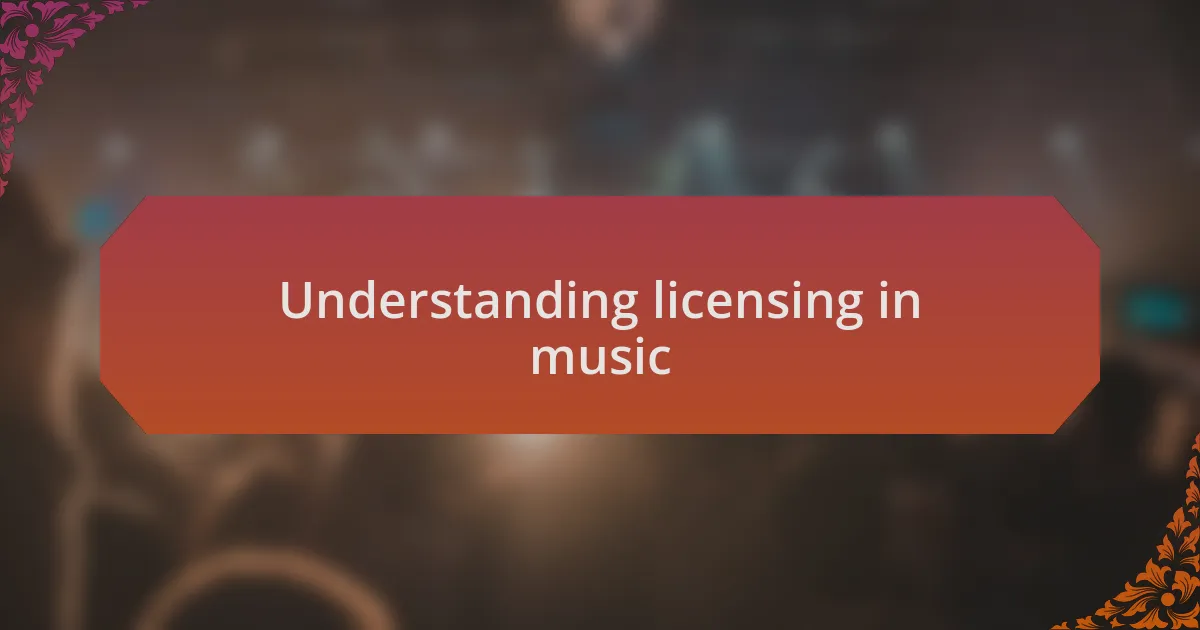
Understanding licensing in music
When diving into the world of music licensing, it’s essential to grasp that the industry is built on a web of rights and permissions. I can still remember my early days, feeling overwhelmed by the terms like “mechanical rights” and “performance rights.” Each term held a piece of the puzzle that enables creators to profit from their art.
Imagine putting your heart and soul into a track only to find out later that you lack the proper licenses for its distribution. This scenario resonated with me when I first tried to release a compilation album. The lesson was clear: without securing the right licenses, even the best music can struggle to find its audience. Licensing ensures artists receive the recognition and financial support they deserve, turning passion into profit.
Have you ever wondered how songs get selected for movies or commercials? That’s where synchronization rights come into play. I vividly recall a conversation I had with a filmmaker who shared the excitement—and frustration—of seeking the right tracks for his project. It hit me that every song carries not only the artist’s effort but also an intricate legal framework facilitating its use. Understanding these nuances can significantly influence how effectively we navigate the music landscape.
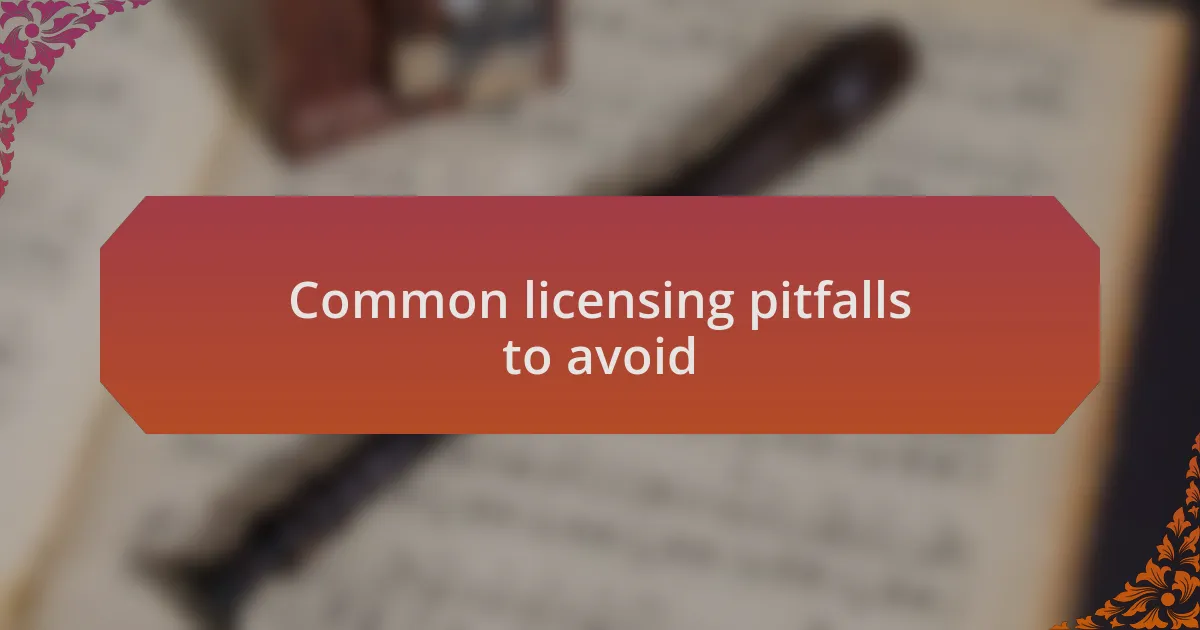
Common licensing pitfalls to avoid
One common pitfall I’ve encountered in licensing is neglecting to double-check ownership. There was a project I worked on where I assumed that a piece was entirely cleared. It turned out that one sample I used wasn’t fully authorized, leading to a stressful situation that could have been avoided with due diligence. This experience taught me that confirming the rights holder’s identity is crucial; a little verification goes a long way.
Another issue arises when independent labels fail to keep track of renewal dates for licenses. I remember setting a calendar reminder for a license expiration, thinking I’d never forget. Yet, life happened, and that reminder slipped my mind. Losing a license can mean halting distribution or worse—facing legal trouble. It’s a stark reminder that staying organized and proactive about renewals isn’t just good practice; it’s essential.
Lastly, I’ve seen musicians and labels gloss over the fine print in licensing agreements. I once signed a deal that appeared straightforward, only to later find hidden stipulations that limited my creative control. Have you ever felt trapped by a contract? I certainly did. Always reading the intricacies is necessary; understanding what you’re agreeing to can save a lot of heartache down the line.
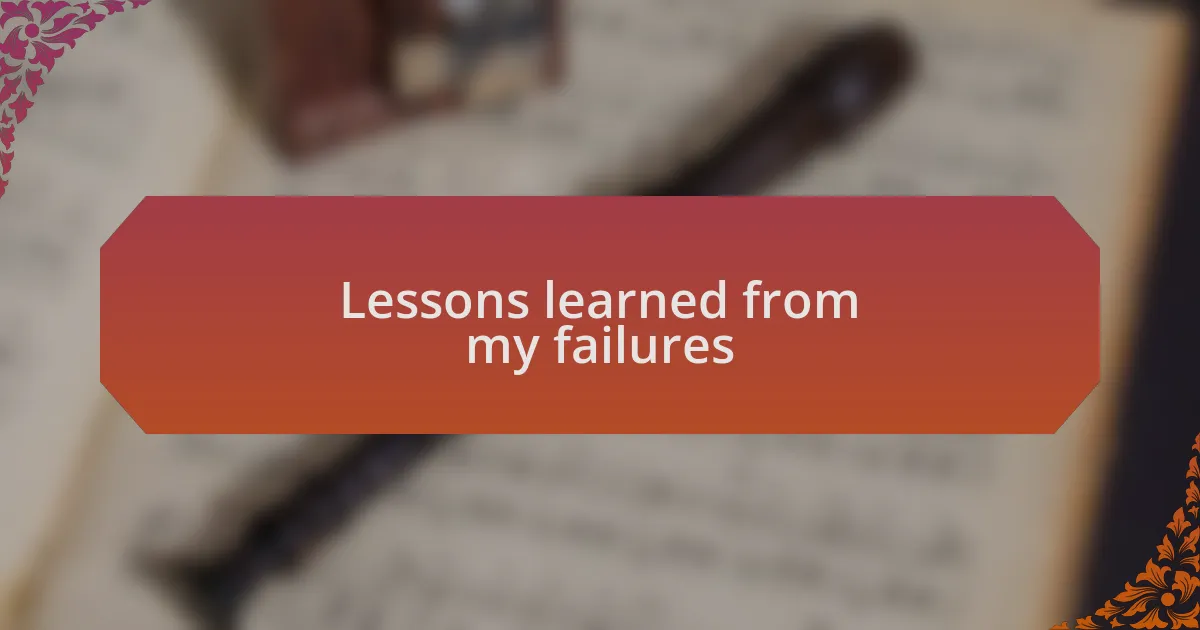
Lessons learned from my failures
Each failure in licensing taught me valuable lessons that I still carry with me. During one project, I faced a frustrating delay because I didn’t secure permission from all parties involved. The anxiety of waiting on approvals made me realize just how crucial it is to involve everyone from the start. Have you ever felt that knot in your stomach while waiting for a crucial email? I learned that collaboration is not just beneficial; it’s essential for smooth sailing.
I also learned the importance of budget management concerning licensing. Early on, I committed to licensing a popular track without fully assessing the financial implications. After the initial excitement faded, I found myself struggling to cover the unforeseen costs that came with it. This ordeal taught me that budgeting isn’t merely about knowing how much you have to spend; it’s about anticipating not just the obvious expenses but also potential additional costs that could arise later.
Another significant lesson came when I neglected to consult a legal expert before signing an agreement. I thought I could handle it myself, but after realizing I had agreed to unfavorable terms, I felt a mix of frustration and regret. Have you ever looked back and wished you had taken a different path? This experience reinforced the idea that seeking professional guidance is a worth-while investment. It can really save you from costly mistakes and sleepless nights later on.
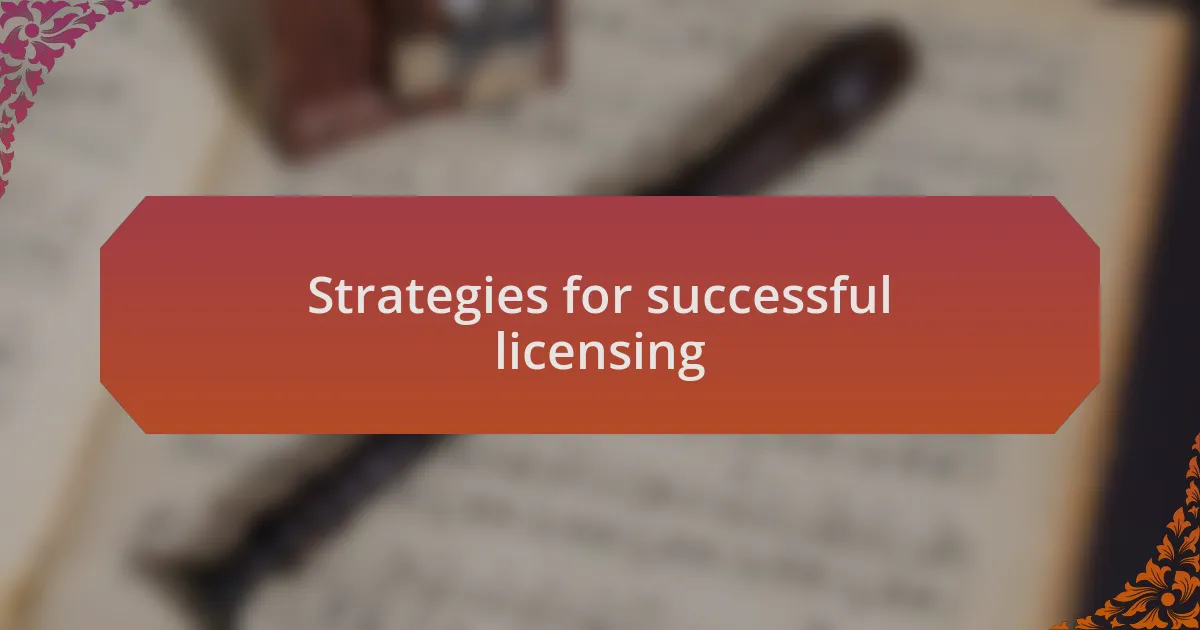
Strategies for successful licensing
When it comes to successful licensing, one strategy that I advocate is creating a detailed checklist before you even approach any stakeholders. I remember a time when I jumped into negotiations without fully understanding each party’s rights and needs. The chaos that followed was a wake-up call; a simple checklist could have streamlined the process and prevented misunderstandings. Have you found yourself scrambling to gather documents at the last minute? That stress can easily be avoided with proper preparation.
Another key strategy is to maintain open lines of communication throughout the licensing process. I once worked on a project where assumptions led me to believe everyone was on the same page. In reality, my collaborators had different expectations, and that disconnect led to frustration for everyone involved. It made me realize that regular updates and discussions can save you from unpleasant surprises and keep the momentum going. How often do you check in with your team or partners to ensure clarity? Setting aside time for consistent dialogue can make a significant difference.
Lastly, don’t underestimate the power of flexibility. Early in my career, I was rigid in my approach and missed out on alternative licensing options that could have been beneficial. A spirit of adaptability allowed me to pivot when challenges arose; I learned that sometimes the best outcomes come from being open to new possibilities. Have you ever hesitated to explore a different route because it felt uncomfortable? Embracing change can lead you to opportunities that you might have otherwise overlooked, enriching both your projects and your relationships.
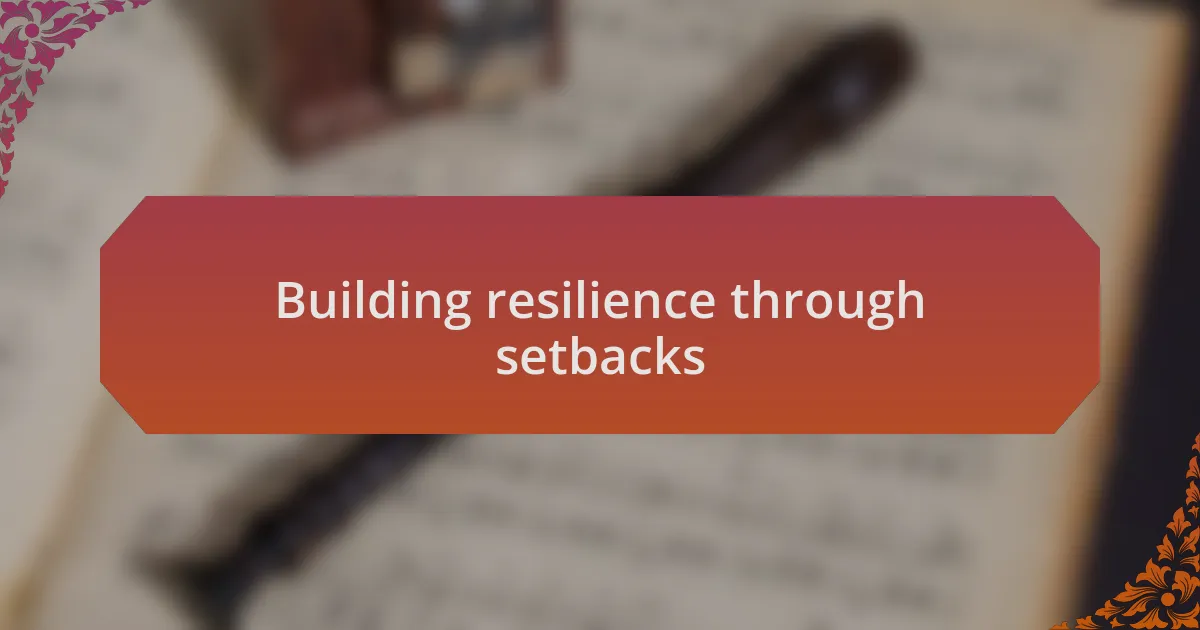
Building resilience through setbacks
Building resilience often means embracing the setbacks that come our way. I vividly recall a licensing deal that fell apart at the last minute due to a minor oversight. The disappointment was palpable. However, this experience taught me the importance of thorough vetting and not overlooking the details. Each setback can serve as a learning moment if we choose to reflect on what went wrong and how to avoid repeating those mistakes.
Sometimes, the hardest lessons stem from our biggest failures. I once faced a significant setback when a crucial track was rejected for licensing due to copyright issues I had overlooked. The initial frustration was overwhelming, but it pushed me to dive deeper into the intricacies of licensing agreements. Now, I feel more equipped than ever to tackle similar challenges head-on. Have you ever had an experience that forced you to reevaluate your approach? Those moments, although painful, are often the catalysts for personal and professional growth.
It’s essential to view setbacks as stepping stones rather than roadblocks. After a challenging period with a particular artist’s rights, I learned to approach each new deal with renewed patience and an open mind, knowing that every challenge brings the potential for greater knowledge. I now see obstacles as opportunities to strengthen my resolve and improve my strategies. Isn’t it fascinating how our toughest moments can lead to greater clarity in our journey? Embracing this mindset helps cultivate resilience, making us more adept at navigating the complexities of our industry.
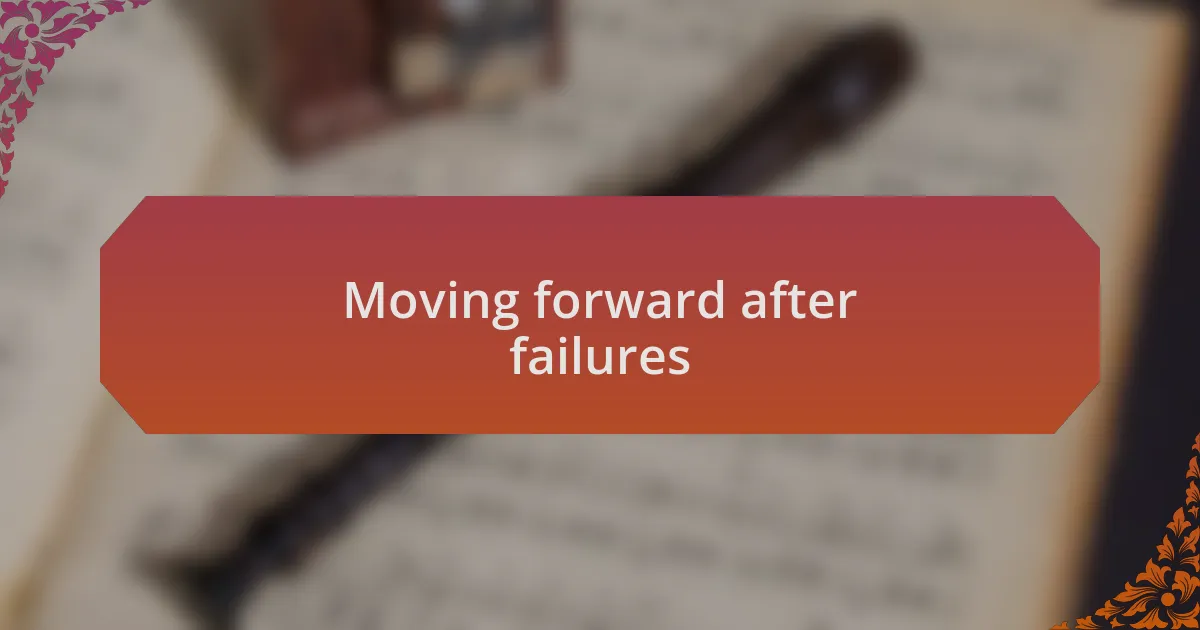
Moving forward after failures
I remember a time when I felt like I hit rock bottom after a licensing failure. A promising collaboration unraveled because of miscommunication, leaving me with a sense of defeat. But rather than dwell on the disappointment, I chose to dissect the situation. What caused the breakdown? By analyzing the breakdown of communication, I learned that fostering stronger relationships and clear dialogues with partners can prevent similar issues.
Sometimes, the path to recovery isn’t straightforward. After losing a key deal, I felt a mix of anger and uncertainty. It was easy to blame external factors, but I had to confront my own role in the situation. This introspection was uncomfortable, yet it was crucial. I now actively seek feedback, constantly asking myself, “How can I improve?” This has transformed my approach to future negotiations, ensuring I remain adaptable and proactive.
As I moved past these failures, I discovered the value of mentorship. Connecting with others who had faced similar setbacks offered new perspectives and emotional support. It felt comforting to hear, “You’re not alone in this!” Sharing these experiences not only lightened my emotional load but also provided insights that ignited my creativity for future projects. How often do we think about the collective wisdom available to us? It’s a powerful reminder that every misstep can become a stepping stone, especially when we lean on our community.